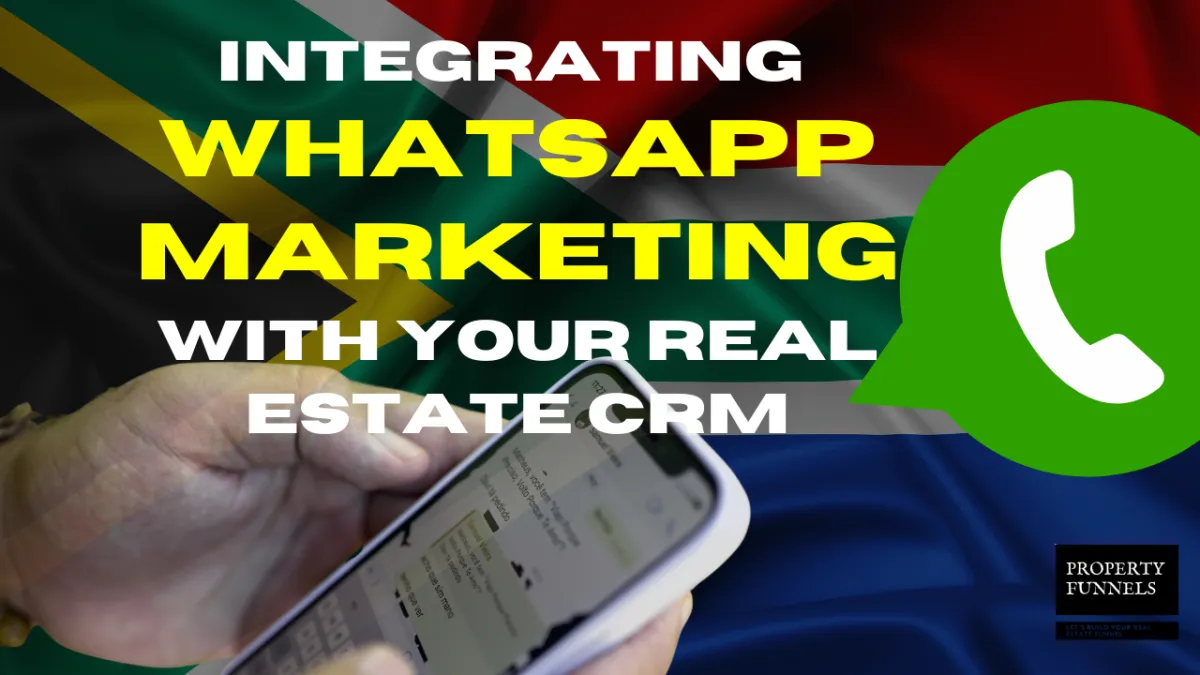Property Funnels Blog
All our latest blogs, in one place

Integrating WhatsApp Marketing with Your Real Estate CRM
In the fast-paced South African real estate market, effective communication can make the difference between closing a deal and losing a prospect to a competitor.
As property professionals juggle multiple listings, inquiries, and client relationships, the traditional methods of email and phone calls often fall short in delivering the immediate, personalized engagement that today's clients expect.
This communication gap represents one of the most significant challenges facing real estate agents across the country.
WhatsApp has emerged as the dominant messaging platform in South Africa, with over 90% of internet users actively engaging with the app daily. It's where your clients already spend their time, exchanging messages with friends and family, sharing media, and increasingly, expecting to connect with businesses.
This ubiquitous presence creates an unprecedented opportunity for real estate professionals to meet clients where they are most comfortable and responsive.
However, despite WhatsApp's popularity, many agencies still treat it as a standalone communication channel, disconnected from their broader client management systems. This siloed approach creates friction in the client journey, with valuable information scattered across platforms, inconsistent follow-ups, and missed opportunities to nurture relationships effectively.
The gap between lead generation and conversion grows wider when communication channels aren't integrated into a cohesive system.
This is where the integration of WhatsApp marketing with your real estate Customer Relationship Management (CRM) system becomes transformative.
By connecting these powerful tools, South African real estate professionals can create a seamless communication ecosystem that captures, nurtures, and converts leads with unprecedented efficiency.
WhatsApp-CRM integration eliminates the disconnect between client conversations and your database, ensuring that every interaction is tracked, personalized, and leveraged to move prospects through your sales funnel.
The benefits of this integration extend far beyond convenience. When implemented effectively, WhatsApp-CRM integration enables real-time response to property inquiries, automated yet personalized follow-up sequences, data-driven client segmentation, and comprehensive analytics to continuously optimize your communication strategy.
For South African agents facing increasing competition and evolving client expectations, this technological synergy provides a significant competitive advantage.
In this comprehensive guide, we'll explore how integrating WhatsApp marketing with your real estate CRM can revolutionize your client communication, streamline your workflows, and ultimately drive more successful transactions.
From technical implementation considerations to practical workflows, personalization strategies, and compliance requirements specific to the South African market, you'll discover everything you need to leverage this powerful combination for your agency's growth and success.
Table of Contents
Why WhatsApp Marketing and CRM Integration is Essential for SA Real Estate Agents
Technical Foundations: How WhatsApp-CRM Integration Works
Setting Up WhatsApp-CRM Integration: A Step-by-Step Guide
Essential WhatsApp-CRM Workflows for Real Estate Success
Automated First Response Workflow
Offer and Transaction Workflows
Post Sale and Referral Workflows
Personalizing Client Communication Through CRM Data
Measuring Success: Analytics and Optimization
Case Study: South African Agencies Transforming Results with WhatsApp-CRM Integration
Future Trends: What's Next for WhatsApp Marketing in Real Estate
Conclusion: Taking the Next Step in Your WhatsApp-CRM Journey
Why WhatsApp Marketing and CRM Integration is Essential for SA Real Estate Agents
In the competitive South African real estate landscape, the difference between thriving agencies and those merely surviving often comes down to how effectively they manage client relationships and communication.
Traditional communication methods—while still valuable—increasingly fall short of meeting modern client expectations.
Let's explore why integrating WhatsApp marketing with your CRM system isn't just beneficial but essential for real estate professionals in South Africa today.
The disconnection between communication channels represents one of the most significant operational challenges for real estate agents.
Without integration, valuable client information remains scattered across platforms—property preferences noted in emails, viewing feedback captured in phone calls, and follow-up questions received via WhatsApp.
This fragmentation creates information silos that hinder personalized service and slow down response times. Agents waste precious hours manually transferring information between systems, increasing the risk of errors and missed opportunities.
In a market where timing can determine whether a sale is secured or lost, these inefficiencies directly impact your bottom line.
South African clients have rapidly evolving expectations when it comes to business communication. Research shows that modern property buyers and sellers expect responses within minutes, not hours or days.
The traditional approach of collecting leads and following up later no longer meets market standards. When a potential buyer inquires about a property on Property24 or your website, they're likely simultaneously messaging other agents about similar listings.
The agent who responds first with relevant, personalized information gains a significant advantage. WhatsApp-CRM integration enables this immediate, contextual response by putting client history and property details at your fingertips the moment an inquiry arrives.
The competitive advantage of integrated systems extends beyond speed. In a market where differentiation is challenging, the quality of client experience becomes a crucial distinguishing factor.
Agencies that deliver seamless, personalized communication stand out in a crowded field. When your CRM and WhatsApp are integrated, you create a continuous client journey where every interaction builds upon previous conversations.
Clients notice when you remember their preferences, reference past viewings, or proactively share new listings that match their specific criteria. This level of service creates not just satisfied clients but enthusiastic advocates who refer others to your agency.
The statistics on WhatsApp usage in South Africa underscore why this platform deserves special attention in your communication strategy.
With over 23 million South African users and a penetration rate exceeding 90% among smartphone owners, WhatsApp has become the default communication channel for most of your potential clients.
Unlike email, which averages open rates of 20-30%, WhatsApp messages see open rates of 98% and response rates of 40-60%—far outperforming any other digital communication channel. This extraordinary engagement level makes WhatsApp the most effective platform for time-sensitive communications like viewing confirmations, offer updates, and document requests.
From an ROI perspective, WhatsApp-CRM integration delivers measurable benefits that justify the investment.
Agencies implementing this integration typically report 30-50% reductions in lead response times, 25-40% increases in lead conversion rates, and significant improvements in client retention.
The efficiency gains alone—with agents saving 5-10 hours weekly on administrative tasks—can transform your agency's productivity.
Rather than manually logging conversations or searching for client information across platforms, your team can focus on high-value activities like property showings, negotiations, and relationship building. For agency owners and managers, this means more transactions completed with the same team size, directly improving profitability.
Beyond these operational benefits, WhatsApp-CRM integration addresses a fundamental truth about real estate: it remains a relationship business at its core.
While technology enables efficiency, the human connection determines success. By automating routine communications and ensuring consistent follow-up, integration frees your agents to focus on building genuine relationships with clients.
The system handles the process, allowing your team to concentrate on adding personal value through market insights, negotiation expertise, and emotional support during what is often a stressful life event for clients.
This balance of automation and personalization represents the ideal approach to modern real estate marketing.
Technical Foundations: How WhatsApp-CRM Integration Works
Understanding the technical foundations of WhatsApp-CRM integration is essential for real estate professionals looking to implement this powerful combination effectively.
While you don't need to be a developer to leverage these technologies, a basic understanding of how they connect will help you make informed decisions and maximize the benefits for your agency.
The cornerstone of professional WhatsApp marketing is the official WhatsApp Business API. Unlike the consumer WhatsApp app or even the basic WhatsApp Business app, the Business API is designed specifically for medium to large businesses that need to communicate with customers at scale.
For South African real estate agencies, this official channel provides the reliability, security, and compliance features necessary for professional client communication. The WhatsApp Business API doesn't come with its own interface; instead, it connects to your existing systems—most importantly, your CRM—through authorized service providers like Property Funnels.
It's crucial to distinguish between official and unofficial methods of WhatsApp integration. Unofficial methods, often marketed as cost-effective alternatives, typically involve using the consumer WhatsApp app or unauthorized third-party tools to send bulk messages.
While these might seem appealing from a cost perspective, they violate WhatsApp's terms of service and carry significant risks.
Agencies using these methods frequently face account suspensions, permanent bans, and potential reputation damage. In the South African context, where POPIA compliance is mandatory, unofficial methods also create serious legal vulnerabilities by potentially exposing client data without proper safeguards.
When it comes to CRM integration options for real estate, several approaches exist depending on your current systems and requirements.
The most comprehensive integration involves direct API connections between your CRM and WhatsApp through an authorized Business Solution Provider (BSP).
This approach enables two-way communication, with messages from clients automatically appearing in your CRM and outbound messages being triggered directly from client records. For agencies using established real estate CRMs like Property Funnels, native integrations already exist, simplifying the setup process.
Alternative integration methods include middleware platforms that connect your existing CRM to WhatsApp, or email-to-WhatsApp gateways that convert CRM-triggered emails into WhatsApp messages.
These options vary in complexity, cost, and capabilities, making it important to assess your specific needs before selecting an approach. For smaller agencies or those with limited technical resources, working with a specialized provider like Property Funnels that offers pre-built integration can significantly reduce implementation time and complexity.
Data synchronization between platforms represents one of the most valuable aspects of WhatsApp-CRM integration.
When properly configured, this synchronization ensures that client information, property preferences, conversation history, and interaction timelines are consistently updated across systems.
For example, when a client responds to a property listing shared via WhatsApp, their feedback can automatically be logged in their CRM record, triggering appropriate follow-up actions. This bidirectional data flow eliminates manual data entry, reduces errors, and creates a single source of truth for client information.
Authentication and security considerations are paramount when implementing WhatsApp-CRM integration, particularly in the real estate sector where sensitive financial and personal information is routinely exchanged.
The official WhatsApp Business API implements end-to-end encryption for all messages, providing a secure channel for client communication.
However, agencies must ensure that their CRM and integration layers maintain this security standard. This includes implementing proper access controls, regular security audits, and secure handling of authentication credentials. For South African agencies, working with providers that understand local security requirements and can demonstrate robust security practices is essential.
POPIA compliance adds another critical dimension to WhatsApp-CRM integration for South African real estate professionals.
The Protection of Personal Information Act places specific requirements on how client data is collected, stored, processed, and shared. Your integrated WhatsApp-CRM solution must include features for obtaining and recording explicit consent for WhatsApp communication, managing opt-outs efficiently, and documenting data processing activities.
The system should also facilitate data subject access requests and implement appropriate data retention policies. While these requirements might seem daunting, a properly configured WhatsApp-CRM integration actually simplifies compliance by centralizing consent management and creating auditable records of all client communications.
The technical architecture of your WhatsApp-CRM integration will influence its capabilities, cost, and maintenance requirements. Cloud-based solutions typically offer greater flexibility and lower upfront costs, while on-premises systems might be preferred by larger agencies with specific security requirements.
Regardless of the architecture, ensuring scalability is important—your solution should accommodate growth in message volume, user numbers, and feature requirements without requiring a complete overhaul.
For most South African real estate agencies, a cloud-based solution with local support provides the optimal balance of cost, performance, and reliability.
Setting Up WhatsApp-CRM Integration: A Step-by-Step Guide
Implementing WhatsApp-CRM integration for your real estate agency doesn't have to be overwhelming. By following a structured approach, even agencies with limited technical resources can successfully deploy this powerful combination.
This step-by-step guide will walk you through the process, from selecting the right tools to training your team for optimal results.
The foundation of successful WhatsApp-CRM integration begins with selecting the right CRM system that offers robust WhatsApp capabilities.
For South African real estate agencies, this decision is particularly important as your CRM should understand local market dynamics and compliance requirements. When evaluating potential CRM solutions, prioritize those with native WhatsApp integration or well-documented API connections to WhatsApp Business Solution Providers.
Look specifically for features like two-way messaging, template management, automated workflows, and detailed analytics.
South African-focused CRMs like Property Funnels offer specialized features designed for the local real estate market, including integration with popular portals like Property24 and Private Property, which can streamline your lead management process.
Beyond basic WhatsApp connectivity, assess whether the CRM provides the real estate-specific functionality your agency needs.
This includes property listing management, buyer-seller matching, document storage, and transaction tracking. The ideal solution combines powerful communication tools with comprehensive real estate features, creating a unified platform for your entire business operation.
Consider factors like ease of use, mobile accessibility, and scalability to ensure the system can grow with your agency. Most importantly, verify that the solution complies with POPIA requirements for data protection and privacy, as non-compliance can result in significant penalties.
Once you've selected your CRM platform, the next step is getting approved for the WhatsApp Business API. Unlike the standard WhatsApp Business app, which is suitable for small businesses with limited messaging needs, the Business API is designed for organizations requiring scalable, automated communication capabilities.
The approval process typically involves working with an authorized WhatsApp Business Solution Provider (BSP) who will guide you through the verification steps. This includes confirming your business identity, agreeing to WhatsApp's business terms, and setting up your business profile with accurate information.
In South Africa, several BSPs offer WhatsApp Business API services, including local providers with specific expertise in the real estate sector.
When selecting a BSP, consider factors like pricing structure (typically based on conversation volumes), local support availability, integration capabilities with your chosen CRM, and experience with real estate clients.
The approval process can take anywhere from a few days to several weeks, depending on your business verification status and the BSP's efficiency. During this time, you can begin preparing your CRM system and planning your WhatsApp communication strategy.
The configuration and setup process varies depending on your chosen CRM and BSP, but typically includes several key steps.
First, you'll need to establish the technical connection between your WhatsApp Business API account and your CRM system. This usually involves API key exchanges and configuration settings provided by your BSP. Next, you'll set up your WhatsApp business profile with your agency logo, description, and contact information to create a professional presence.
Then, you'll configure message templates for common communications like property inquiries, viewing confirmations, and follow-ups. These templates must be submitted for approval by WhatsApp to ensure they meet quality guidelines and don't contain prohibited content.
Within your CRM, you'll need to configure workflows that determine when and how WhatsApp messages are triggered.
For example, you might create an automated sequence that sends a WhatsApp message when a new lead is assigned to an agent, or when a property matching a buyer's criteria becomes available.
You'll also need to set up user permissions to control which team members can send WhatsApp messages and access conversation histories. Finally, establish data synchronization rules to ensure that WhatsApp interactions are properly recorded in client profiles and that contact information remains consistent across platforms.
Before fully deploying your integrated solution, thorough testing and validation are essential. Create a test environment where you can simulate various client interactions without affecting real customers.
Test each automated workflow, ensuring messages are sent correctly, responses are captured in the CRM, and the system handles various scenarios appropriately. Pay particular attention to personalization elements, making sure that dynamic fields like client names and property details are correctly populated in messages.
Also test the opt-out functionality to confirm that client preferences are respected and properly recorded in compliance with POPIA regulations.
Conduct user acceptance testing with a small group of agents to identify any usability issues or workflow improvements before rolling out to your entire team. This phase often reveals practical insights that technical testing might miss, such as the need for additional templates or refinements to automation rules.
Document any issues encountered and work with your CRM provider and BSP to resolve them before proceeding to full implementation.
The final and perhaps most crucial step is training your team for effective use of the integrated system.
Even the most powerful technology fails to deliver results if your agents don't understand how to leverage it properly. Develop a comprehensive training program that covers both the technical aspects of using the system and the strategic best practices for WhatsApp communication.
Include sessions on navigating the CRM interface, sending and responding to WhatsApp messages, using templates effectively, and understanding analytics to optimize performance.
Beyond technical training, emphasize the importance of communication etiquette and compliance requirements. Agents should understand the appropriate tone and timing for WhatsApp communications, as well as the legal obligations regarding client consent and data protection.
Role-playing exercises can be particularly effective for practicing common scenarios like responding to property inquiries or handling objections via WhatsApp. Consider designating "power users" within your team who receive advanced training and can support their colleagues during the transition period.
After implementation, schedule regular check-ins to address any challenges and share success stories. This ongoing support helps maintain momentum and ensures that the integration delivers sustained value for your agency. Remember that successful WhatsApp-CRM integration is not a one-time project but an evolving capability that should be continuously refined based on client feedback, market changes, and emerging best practices.
Essential WhatsApp-CRM Workflows for Real Estate Success
When your WhatsApp marketing is integrated with your CRM system, you unlock powerful automated workflows that can transform your real estate business.
These workflows combine the immediate engagement of WhatsApp with the organizational capabilities of your CRM to create seamless client experiences.
Let's explore the essential workflows that South African real estate agents should implement to maximize their success with WhatsApp-CRM integration.
Automated First Response Workflow

Automated lead qualification and response represents the first critical workflow in your WhatsApp-CRM ecosystem.
When a new lead comes in—whether from your website, Property24, or other sources—your integrated system can immediately engage them via WhatsApp. This initial contact serves multiple purposes: it acknowledges their inquiry, sets expectations for next steps, and begins the qualification process.
For example, when someone inquires about a specific property, your system can automatically send a WhatsApp message thanking them for their interest, providing additional details about the property, and asking qualifying questions like their timeline for buying or specific features they're looking for.
Their responses are captured in your CRM, updating their lead profile and helping prioritize follow-up actions.
The beauty of this workflow lies in its speed and consistency. Research shows that leads contacted within five minutes are 21 times more likely to convert than those contacted after 30 minutes.
With WhatsApp-CRM integration, this initial response happens instantly, regardless of time of day or your agents' availability. The system can be configured to route leads to specific agents based on property type, location, or other criteria, ensuring that each inquiry receives appropriate attention.
For high-value leads, the system can also alert agents via CRM app or email that an important WhatsApp conversation has begun, prompting them to take over the conversation personally.
Property inquiry handling and follow-up sequences form the next essential workflow.
When potential buyers express interest in specific properties, your integrated system can deliver a carefully designed sequence of WhatsApp messages that nurture their interest while gathering valuable information.
This sequence might begin with detailed property information and high-quality images, followed by neighborhood insights, financing options, and eventually, an invitation to schedule a viewing. Each message in the sequence can be triggered based on specific timeframes or client actions, creating a responsive yet automated conversation.
The CRM component of this workflow ensures that all client responses and preferences are captured and used to refine future communications.
For instance, if a client mentions they're particularly interested in properties with large gardens, this preference can be tagged in their CRM profile, influencing both automated messages and agent interactions.
The system can also track engagement metrics like message open rates and response times, helping you identify which properties generate the most interest and which messaging approaches are most effective.
Viewing appointment scheduling and reminders represent a workflow where WhatsApp-CRM integration delivers exceptional value. Once a prospect expresses interest in viewing a property, your integrated system can facilitate the entire scheduling process via WhatsApp.
This includes suggesting available time slots (pulled from your agents' CRM calendars), confirming appointments, sending location details with map links, and providing agent contact information. The day before the viewing, an automated reminder can be sent, reducing no-show rates and allowing clients to easily reschedule if needed.
This workflow significantly reduces the administrative burden on your team while improving the client experience. Rather than the typical back-and-forth of phone calls and emails to arrange viewings, the entire process happens in a channel the client already uses daily.
The CRM component ensures that all viewing activities are properly logged, creating a comprehensive history of client interactions and property interests. After the viewing, the system can automatically trigger a follow-up message asking for feedback, which further enriches the client's profile and informs future property recommendations.
Offer and Transaction Workflows

Offer and transaction status updates provide transparency and reduce anxiety during the critical phases of a property transaction.
Once a client has made an offer on a property, your WhatsApp-CRM integration can keep them informed at every stage of the process.
Automated updates can be triggered when the offer is presented to the seller, when counteroffers are made, when the offer is accepted, and during subsequent steps like home inspection, financing approval, and document preparation.
These updates can include both standard status information and personalized notes from the agent handling the transaction.
This workflow addresses one of the most common client complaints in real estate: lack of communication during the transaction process.
By providing proactive, consistent updates via WhatsApp, you reduce client anxiety and minimize time-consuming status inquiry calls. The CRM component ensures that all transaction milestones are properly tracked and that the right messages are sent at the right time.
It also allows multiple team members to see the current status of each transaction, ensuring consistent communication even if the primary agent is temporarily unavailable.
Post Sale and Referral Workflows
Post-sale nurturing and referral generation workflows extend the value of your client relationships beyond the initial transaction.
After a successful property purchase or sale, your WhatsApp-CRM integration can deliver a sequence of messages designed to ensure client satisfaction and generate referrals and future business. This might include check-in messages at key intervals (one week, one month, six months post-transaction), home maintenance tips, neighborhood updates, and occasional market insights that keep your agency top-of-mind.
The referral component of this workflow is particularly valuable. Research shows that satisfied clients are most likely to refer others within the first 30 days after their transaction closes.
Your integrated system can automatically send a WhatsApp message during this window, thanking the client for their business and making it easy for them to refer friends or family. This message can include a simple link that allows them to share your contact information directly with potential referrals via WhatsApp, creating a seamless referral process that maximizes results.
Each of these workflows represents a significant opportunity to improve both efficiency and effectiveness in your real estate business.
When implemented thoughtfully, they create a communication ecosystem that feels personal and responsive to clients while requiring minimal manual intervention from your team. The key to success lies in designing workflows that reflect your agency's unique value proposition and client service philosophy, then continuously refining them based on performance data and client feedback.
Personalizing Client Communication Through CRM Data
The true power of WhatsApp-CRM integration lies in personalization. When your messaging is informed by rich client data stored in your CRM, communications transform from generic broadcasts to highly relevant, individualized conversations.
This personalization creates stronger client relationships and significantly improves conversion rates for South African real estate professionals.
Leveraging contact information for personalization begins with the basic details captured in your CRM. Beyond simply addressing clients by name (though this remains important), effective personalization incorporates relevant contextual information throughout the client journey.
For example, when sending property recommendations via WhatsApp, your message can reference the client's current location ("As you're currently living in Sandton..."), their stated timeline ("Since you mentioned wanting to move by September..."), or their relationship to the property search ("As you're helping your daughter find her first apartment..."). These contextual references demonstrate attentiveness and create a more engaging conversation.
The depth of personalization possible depends on the quality of data in your CRM. This underscores the importance of systematic data collection during every client interaction.
Your integrated system should make it easy for agents to record valuable insights from WhatsApp conversations, property viewings, and other touchpoints. Even seemingly minor details—a client mentioning their hobby of gardening or their need for a home office—can become powerful personalization elements in future communications.
The most sophisticated agencies develop structured approaches to data collection, ensuring consistent information gathering across their team.
Property preference tracking and matching represents one of the most valuable applications of personalized WhatsApp communication.
As clients interact with your agency, their CRM profile should build a detailed picture of their property preferences—not just basic criteria like location and price range, but specific features, deal-breakers, and priorities.
When integrated with WhatsApp, this preference data enables highly targeted property recommendations. Rather than sending generic listings, you can deliver personalized messages that explain exactly why a particular property matches their unique requirements: "Based on your interest in properties with large entertainment areas and north-facing gardens, I thought you'd want to see this new listing in Bryanston..."
This level of matching creates several advantages. First, it demonstrates your understanding of the client's needs, building trust in your expertise.
Second, it increases engagement with your messages, as clients recognize the relevance to their specific search.
Finally, it improves conversion rates by focusing client attention on properties they're most likely to purchase. The WhatsApp channel is particularly effective for these targeted recommendations, as its high open rates ensure your carefully matched properties actually get seen.
Communication history and context awareness further enhance personalization by creating continuity across interactions. When a client responds to a WhatsApp message, your integrated system should provide agents with immediate access to the entire conversation history, along with relevant notes and activities from the CRM.
This context allows for seamless conversations even when different team members are involved or when interactions span multiple channels. For example, if a client mentions during a property viewing that they're concerned about school districts, this information should be visible when an agent follows up via WhatsApp, allowing them to address this specific concern.
This contextual awareness is particularly valuable in real estate, where the buying or selling process often extends over weeks or months with multiple touchpoints. Clients quickly become frustrated when they have to repeat information or when agents fail to remember important details from previous conversations.
WhatsApp-CRM integration eliminates these friction points by ensuring that every team member has access to the complete client context before engaging. The result is a cohesive client experience that builds confidence in your agency's professionalism and attention to detail.
Segmentation strategies for targeted messaging take personalization beyond the individual level to create relevant communications for specific client groups.
Your CRM data allows you to segment clients based on numerous criteria: property type interest, price range, buying timeline, neighborhood preference, or transaction history. These segments can then receive tailored WhatsApp campaigns that address their specific needs and interests. For example, investors looking for rental properties might receive different market updates than first-time homebuyers, while clients interested in specific neighborhoods could receive area-specific news and listings.
Effective segmentation requires both thoughtful strategy and technical implementation. Start by identifying the most meaningful ways to group your clients based on your business objectives and client needs.
Then, ensure your CRM is configured to capture and organize the necessary data points.
Finally, create segment-specific message templates and automation rules that deliver the right content to each group. Regularly review segment performance to refine your approach, paying attention to engagement metrics like response rates and conversions.
Balancing automation with personal touch represents the final consideration in personalized WhatsApp communication. While automation enables efficiency and consistency, the human element remains essential in real estate relationships.
The most successful agencies use their integrated systems to identify when personal intervention is most valuable, rather than attempting to automate every interaction. For example, automated workflows might handle routine updates and initial inquiries, while agents personally manage sensitive negotiations, complex questions, or high-value client communications.
This balanced approach requires thoughtful workflow design and clear guidelines for your team. Establish protocols for when agents should take over automated conversations, how they should review conversation history before engaging, and how to maintain a consistent tone across automated and personal messages.
Also consider implementing "hybrid" approaches where automation handles the logistics of communication (timing, delivery, data capture) while agents provide personalized content. For instance, your system might automatically trigger a follow-up message after a property viewing, but the agent could quickly customize the content based on specific observations from the viewing.
The personalization capabilities enabled by WhatsApp-CRM integration create a significant competitive advantage in the South African real estate market.
As clients increasingly expect tailored experiences, agencies that master this personalized approach will stand out from competitors still sending generic mass communications.
By thoughtfully leveraging your CRM data to inform WhatsApp interactions, you create more meaningful client relationships, improve conversion rates, and ultimately drive greater business success.
Measuring Success: Analytics and Optimization
Implementing WhatsApp-CRM integration is just the beginning of your journey. To maximize return on investment and continuously improve your communication strategy, you need to measure performance and optimize based on data.
This section explores the key metrics to track, reporting capabilities to leverage, and optimization strategies to implement for your WhatsApp marketing efforts in South African real estate.
Key performance indicators (KPIs) for WhatsApp marketing should align with your broader business objectives while addressing the unique characteristics of the channel.
Start by tracking delivery and engagement metrics: message delivery rates, open rates, response rates, and average response time. WhatsApp typically shows superior performance compared to email or SMS, with open rates often exceeding 95% and response rates between 35-60% for well-crafted messages.
Establishing your agency's baseline metrics allows you to identify both successful campaigns and areas for improvement.
Beyond these basic engagement metrics, conversion-focused KPIs provide deeper insight into business impact. Track metrics like inquiry-to-viewing conversion rate (what percentage of WhatsApp inquiries result in property viewings), viewing-to-offer rate (how many viewings lead to offers), and ultimately, closed deals attributed to WhatsApp communication.
For nurturing campaigns, measure metrics like client retention rate and referral generation. The integrated nature of your WhatsApp-CRM system makes these advanced measurements possible by connecting communication activities directly to business outcomes.
Time-based metrics offer another valuable perspective, particularly in the fast-moving real estate market. Monitor your average lead response time via WhatsApp compared to other channels, as well as the average time from initial inquiry to viewing appointment.
Research consistently shows that faster response times correlate strongly with higher conversion rates, making this a critical area for optimization. Your WhatsApp-CRM integration should significantly improve these metrics by enabling immediate automated responses followed by timely agent follow-up.
CRM reporting capabilities for WhatsApp campaigns vary depending on your chosen platform, but most modern systems offer robust analytics tools.
Look for dashboards that provide both high-level performance summaries and the ability to drill down into specific campaigns, templates, or agent activities. The most valuable reports combine quantitative metrics (like open rates and conversions) with qualitative insights (like common client questions or feedback themes).
These comprehensive views help you understand not just what is happening but why it's happening, informing more effective optimization strategies.
Agent performance reporting represents another important dimension of WhatsApp analytics. Track metrics like response time, message quality, client engagement rates, and conversion rates for individual team members.
These insights help identify best practices that can be shared across the team, as well as opportunities for additional training or support. When implementing agent-level reporting, focus on improvement rather than criticism, using the data to facilitate constructive coaching conversations and recognize outstanding performance.
A/B testing message templates and sequences allows you to systematically improve your WhatsApp communication strategy. This structured approach involves creating variations of your messages—testing different elements like tone, length, call-to-action phrasing, or content focus—and measuring which performs better with similar audience segments.
For example, you might test whether property listings with virtual tour links generate more viewing requests than those with just photos, or whether messages focused on investment potential outperform those highlighting lifestyle benefits for a particular property type.
To conduct effective A/B tests, follow a methodical process: identify a specific element to test, create two variations that differ only in that element, randomly assign recipients to receive each version, measure relevant metrics, and implement the winning approach in future campaigns.
Most importantly, test only one variable at a time to ensure clear, actionable results. Your integrated WhatsApp-CRM system facilitates this testing by providing the technical infrastructure to deploy different message versions and the analytics capabilities to measure outcomes.
Optimizing response times and conversion rates often involves refining your automation rules and workflow triggers. Analyze your conversion funnel to identify potential bottlenecks or drop-off points where clients disengage.
For instance, if you notice that many prospects respond to initial property information but don't proceed to schedule viewings, you might need to adjust your follow-up sequence timing or content. Similarly, if certain property types or price ranges show lower engagement, consider developing specialized messaging approaches for these segments.
The timing of your WhatsApp communications can significantly impact their effectiveness. Use your CRM analytics to identify patterns in client responsiveness based on day of week and time of day.
While WhatsApp messages generally receive attention regardless of timing (unlike email), client response rates may vary based on when messages are received. In the South African context, consider factors like commuting patterns in major cities, typical working hours, and cultural preferences when optimizing your messaging schedule.
Calculating ROI on your WhatsApp-CRM investment requires connecting communication activities to financial outcomes.
Track both direct costs (platform fees, implementation expenses, ongoing maintenance) and indirect costs (staff time for management and content creation).
On the revenue side, attribute closed deals and their commission value to WhatsApp-influenced conversions. Most CRM systems allow for attribution modeling that recognizes the role of multiple touchpoints in the client journey, giving appropriate credit to WhatsApp interactions within the broader sales process.
Beyond financial ROI, consider operational efficiency gains when evaluating your WhatsApp-CRM integration. Measure time saved through automation, reduction in missed follow-ups, decreased administrative burden, and improved team collaboration.
These efficiency improvements often translate to significant value by allowing your team to handle more clients effectively or focus more attention on high-value activities like relationship building and negotiation rather than administrative tasks.
Continuous improvement should be built into your WhatsApp marketing approach. Establish a regular review cycle—monthly or quarterly—to analyze performance data, identify optimization opportunities, implement changes, and measure results.
Involve your team in this process, as agents often have valuable frontline insights about client responses and pain points. This systematic approach to optimization ensures that your WhatsApp-CRM integration delivers increasing value over time, adapting to changing market conditions and evolving client expectations in the South African real estate landscape.
Case Study: South African Agencies Transforming Results with WhatsApp-CRM Integration
The theoretical benefits of WhatsApp-CRM integration are compelling, but real-world implementation stories provide the most convincing evidence of its impact.
Let's examine how several South African real estate agencies have transformed their operations and results through strategic WhatsApp-CRM integration, highlighting the challenges they faced, solutions they developed, and measurable outcomes they achieved.
Before implementing WhatsApp-CRM integration, a mid-sized agency operating in Cape Town's Atlantic Seaboard, struggled with typical communication challenges.
Their team of twelve agents managed hundreds of active leads through a fragmented system of emails, phone calls, and personal WhatsApp accounts. This disjointed approach resulted in slow response times (averaging 3.2 hours), inconsistent follow-up, and no centralized record of client conversations.
Leads frequently fell through the cracks, especially during busy periods, and the agency lacked visibility into which communication strategies were most effective.
The transformation began when the agency implemented an integrated WhatsApp-CRM solution through Property Funnels.
They started with a clear implementation plan that included migrating their existing client database, setting up automated workflows, and training their team on the new system.
The initial challenges were both technical and cultural—integrating with their existing tools required some customization, and agents accustomed to managing client relationships through personal channels needed to adapt to the centralized approach.
The agency overcame these challenges through a phased implementation strategy. They began with a core team of early adopters who helped refine the workflows before rolling out to the entire agency.
They also developed clear protocols for when to use automated messages versus personal responses, ensuring that the efficiency gains didn't come at the expense of the personal touch their clients valued.
Comprehensive training sessions focused not just on technical operation but on how to leverage the system for improved client relationships.
The results were transformative. Within three months, the agency reduced their average lead response time from hours to minutes (now averaging just 8.2 minutes), with initial automated responses delivered instantly.
Lead conversion rates increased by 37%, directly attributable to faster engagement and more consistent follow-up. The integrated system also revealed valuable insights about client preferences and behavior patterns that informed their broader marketing strategy.
Another compelling case comes from a luxury property agency operating in Johannesburg's northern suburbs. Their challenge wasn't volume but rather the high-touch nature of their client relationships and the substantial value of each transaction.
Their affluent clientele expected personalized service and immediate responses, yet their agents were spending excessive time on administrative tasks rather than relationship building.
The agency implemented a sophisticated WhatsApp-CRM integration with a focus on personalization and seamless handoffs between automated systems and their agents.
They created detailed client profiles in their CRM, capturing preferences from property styles to investment goals, and used this data to power highly personalized WhatsApp communications.
They also implemented a "warm handoff" protocol where automated initial responses would alert the appropriate agent to continue the conversation personally within minutes.
The implementation challenges for the agency centered around maintaining their premium brand voice in automated communications and ensuring that the technology enhanced rather than detracted from their high-touch service model.
They invested significant time in crafting message templates that reflected their brand's sophisticated tone and training their team to seamlessly transition from automated to personal communication without clients feeling the shift.
The results validated their approach: client satisfaction scores increased by 22%, and their agents reported being able to handle 40% more inquiries while actually spending more time on meaningful client interactions rather than administrative tasks.
Perhaps most significantly, their average days-to-sale decreased by 17%, as the improved communication flow kept deals moving forward more efficiently. The agency's referral rate also increased substantially, with clients specifically mentioning the responsive, personalized communication as a reason for recommending the agency.
A different perspective comes from a growing agency focused on first-time home buyers in Pretoria. Their younger client base was already WhatsApp-native and expected digital-first communication, but the agency's manual processes couldn't keep pace with client expectations or their rapid growth.
With limited resources, they needed a solution that could scale their communication capabilities without adding significant headcount.
This emerging agency implemented a WhatsApp-CRM integration with an emphasis on educational content and guided buying journeys.
They created segmented workflows for different buyer profiles, delivering relevant information about the home-buying process, financing options, and neighborhood insights via WhatsApp.
Their implementation challenge was balancing automation with the educational support their first-time buyers needed, ensuring that clients never felt abandoned to a chatbot when they had important questions.
Their solution involved creating comprehensive FAQ flows that could handle common questions automatically while making it easy for clients to connect with a human agent when needed. They also developed clear escalation paths for different types of inquiries, ensuring that financing questions went to agents with specific expertise in that area, while property-specific questions were routed to the listing agent.
The results were particularly impressive given their resource constraints: New Horizons increased their lead handling capacity by 215% without adding staff, while maintaining a client satisfaction rate above 90%.
Their conversion rate for portal-generated leads increased by 42%, and they saw a 68% reduction in the number of leads who disengaged during the initial information-gathering phase. The educational content delivered via WhatsApp also resulted in better-prepared buyers, with agents reporting smoother transactions and fewer last-minute surprises.
These case studies highlight several common themes and lessons learned.
First, successful implementation requires both technical integration and cultural adaptation—the team's buy-in and understanding are as important as the technology itself.
Second, the most effective approaches balance automation with human interaction, using technology to handle routine communications while freeing agents to add value through their expertise and relationship skills.
Third, measurement is crucial for optimization. All three agencies established clear baseline metrics before implementation and tracked specific KPIs throughout the process, allowing them to identify what was working and what needed refinement.
Finally, customization to specific business models and client expectations is essential—there is no one-size-fits-all approach to WhatsApp-CRM integration, and the most successful implementations are tailored to the agency's unique value proposition and client needs.
For South African real estate professionals considering WhatsApp-CRM integration, these case studies provide both inspiration and practical guidance.
The challenges these agencies faced are common across the industry, and their solutions offer proven approaches that can be adapted to different business models and market segments.
While the specific metrics will vary, the fundamental benefits—improved response times, increased conversion rates, enhanced client satisfaction, and greater operational efficiency—are achievable for agencies of all sizes and specializations.
Future Trends: What's Next for WhatsApp Marketing in Real Estate
As WhatsApp-CRM integration becomes increasingly mainstream in South African real estate, forward-thinking agencies are already looking toward the next wave of innovations.
Understanding emerging trends helps you stay ahead of the competition and prepare your business for future opportunities. Let's explore the most significant developments on the horizon for WhatsApp marketing in real estate.
Upcoming WhatsApp Business features continue to expand the platform's capabilities for professional use. Meta regularly enhances the WhatsApp Business API with new functionalities designed to improve customer engagement and business efficiency.
Recent and upcoming features include enhanced catalog capabilities (allowing better showcase of property listings), improved analytics dashboards, and expanded message template options. For South African real estate professionals, these enhancements will enable more sophisticated property marketing directly within WhatsApp conversations.
Particularly noteworthy is WhatsApp's growing focus on in-app commerce features. While currently more oriented toward retail products, these capabilities could soon extend to real estate applications, potentially allowing clients to schedule viewings, submit documentation, or even place holding deposits directly through WhatsApp.
As these features roll out, agencies with established WhatsApp-CRM integration will be best positioned to quickly leverage these new capabilities, creating competitive advantage through early adoption.
AI and chatbot integration represents perhaps the most transformative trend for WhatsApp marketing in real estate.
Artificial intelligence is rapidly advancing beyond simple rule-based responses to truly conversational interactions that can understand context, answer complex questions, and learn from each engagement.
When integrated with WhatsApp and your CRM, these AI assistants can handle increasingly sophisticated client interactions while maintaining a natural conversational flow.
In the South African context, AI chatbots are already being deployed for initial lead qualification, answering common questions about listings or neighborhoods, and providing 24/7 response capability.
The next generation of these tools will offer even more advanced capabilities: analyzing client language patterns to detect buying signals, providing personalized property recommendations based on conversation history, and seamlessly transitioning to human agents at precisely the right moment in the customer journey.
For real estate professionals concerned about job displacement, it's important to understand that these technologies are designed to augment rather than replace human expertise. The most effective implementations use AI to handle routine inquiries and initial engagement, freeing agents to focus on high-value activities where their market knowledge, negotiation skills, and emotional intelligence create the greatest impact.
Agencies that find this optimal balance between automation and human touch will gain significant efficiency without sacrificing the relationship-based nature of real estate.
Voice and video communication trends are increasingly relevant as WhatsApp continues to enhance these capabilities. While text remains the primary communication mode, voice messages are gaining popularity for their convenience and personal touch.
In real estate, voice messages allow agents to convey enthusiasm and nuance that might be lost in text, while clients appreciate the ability to ask questions or provide feedback without typing lengthy messages.
Video calling and media sharing capabilities are also evolving rapidly, with implications for virtual property tours and remote client consultations. The integration of these features with CRM systems will enable agents to conduct and record virtual viewings through WhatsApp, with viewing notes and client feedback automatically captured in the CRM.
This functionality is particularly valuable in the South African market, where clients may be relocating from different cities or even internationally, making in-person viewings challenging.
Predictive analytics and advanced personalization represent the convergence of big data capabilities with WhatsApp-CRM integration.
As your integrated system accumulates data on client preferences, behavior patterns, and conversion outcomes, machine learning algorithms can identify subtle patterns that inform increasingly sophisticated personalization strategies.
These systems can predict which properties a client is most likely to be interested in, when they're most receptive to communication, and which messaging approaches are most effective for their specific profile.
For example, predictive analytics might determine that a particular client segment responds best to property recommendations sent on Thursday evenings with video content, while another segment engages more with Sunday morning messages featuring neighborhood statistics.
These insights enable micro-targeted communication strategies that significantly improve engagement and conversion rates. As these capabilities mature, the gap between agencies using advanced analytics and those relying on generic approaches will widen considerably.
The integration of WhatsApp with other digital platforms is creating more seamless client experiences. Emerging trends include connections between WhatsApp and virtual reality platforms for immersive property tours, integration with digital signature and document verification services for paperless transactions, and synchronization with smart home technologies to enhance property viewings.
These integrations extend the utility of WhatsApp beyond communication to facilitate the entire property transaction process.
For South African agencies, integration with local services and platforms is particularly valuable. This includes connections to neighborhood security information, municipal service providers, and community groups that provide contextual information important to property buyers.
Agencies that create these ecosystem connections position themselves as comprehensive resources rather than simply property intermediaries.
Preparing your agency for future innovations requires both technological readiness and organizational adaptability. From a technology perspective, ensure your WhatsApp-CRM integration is built on flexible, API-driven architecture that can accommodate new features and connections.
Work with technology partners who demonstrate a commitment to continuous development and staying current with platform changes. Maintain clean, structured data in your CRM, as high-quality data is the foundation for successful implementation of advanced analytics and AI capabilities.
Organizationally, foster a culture of innovation and continuous learning. Encourage team members to explore new features and suggest potential applications. Develop a systematic approach to evaluating and implementing new capabilities, including pilot testing with specific client segments before full deployment.
Most importantly, maintain focus on client value—adopt new technologies because they improve the client experience or operational efficiency, not simply because they're novel.
The South African real estate market presents unique opportunities for technology innovation due to its combination of sophisticated urban markets and developing areas with rapidly growing connectivity.
Agencies that thoughtfully implement WhatsApp-CRM integration now are building the foundation for competitive advantage as these emerging trends become mainstream. By staying informed about platform developments and continuously refining your approach, you position your agency at the forefront of real estate communication technology in a market where digital excellence increasingly determines business success.
Conclusion: Taking the Next Step in Your WhatsApp-CRM Journey
Throughout this guide, we've explored how integrating WhatsApp marketing with your real estate CRM can transform your client communication, streamline your operations, and ultimately drive better business results.
As we conclude, let's summarize the key benefits and outline practical next steps for South African real estate professionals looking to implement or enhance this powerful integration.
The benefits of WhatsApp-CRM integration for real estate are compelling and multifaceted. By connecting South Africa's most popular messaging platform with your client management system, you create a communication ecosystem that delivers immediate engagement with prospects, consistent follow-up throughout the client journey, and personalized interactions based on comprehensive client data.
This integration addresses the fundamental challenges that many real estate professionals face: responding quickly to inquiries, maintaining organized client information, and delivering personalized service at scale.
From an operational perspective, the efficiency gains are substantial. Automated workflows reduce administrative burden, ensure consistent follow-up, and minimize the risk of leads falling through the cracks.
Your team spends less time on manual data entry and more time on high-value activities that directly impact your bottom line. Meanwhile, the centralized communication history creates transparency across your organization, facilitating better collaboration and ensuring continuity even when different team members interact with the same client.
For your clients, the experience is seamless and impressive. They receive prompt responses to their inquiries, relevant information about properties matching their criteria, and consistent updates throughout their buying or selling journey—all through a platform they already use and trust. This enhanced experience translates to higher client satisfaction, better conversion rates, and ultimately, more referrals and repeat business.
If you're convinced of the value but unsure where to begin, consider these practical next steps for implementation:
Assess your current systems and processes. Evaluate your existing CRM capabilities, communication workflows, and team readiness for integration. Identify specific pain points and opportunities where WhatsApp-CRM integration could deliver the greatest impact for your agency.
Research solution providers with South African expertise. Look for partners who understand the local real estate market, compliance requirements, and client expectations. Property Funnels offers specialized WhatsApp-CRM integration designed specifically for South African real estate professionals, with features tailored to local market needs.
Develop a phased implementation plan. Rather than attempting to transform everything at once, prioritize specific workflows or client segments for initial implementation. This approach allows you to demonstrate value quickly while managing change effectively within your organization.
Invest in proper setup and training. The success of your WhatsApp-CRM integration depends on both technical configuration and team adoption. Allocate sufficient resources to template development, workflow design, and comprehensive training to ensure your team can leverage the system effectively.
Establish baseline metrics and monitoring processes. Before implementation, document your current performance on key metrics like response time, lead conversion rate, and client satisfaction. This baseline allows you to measure the impact of your integration and identify opportunities for ongoing optimization.
For agencies already using some form of WhatsApp marketing, the journey toward more sophisticated integration offers significant opportunities for enhancement.
Consider auditing your current approach against the best practices outlined in this guide: Are you leveraging official WhatsApp Business API channels? Is your client data properly synchronized between platforms? Are you measuring performance and optimizing based on data? Identifying gaps in your current approach can highlight high-impact opportunities for improvement.
The competitive landscape in South African real estate continues to evolve, with digital excellence increasingly separating market leaders from the rest of the field.
WhatsApp-CRM integration represents not just a technological upgrade but a strategic advantage that positions your agency for success in this changing environment. By meeting clients where they are—on WhatsApp—and delivering exceptional, personalized service through this channel, you create meaningful differentiation in a crowded marketplace.
Remember that successful implementation is not a destination but a journey of continuous improvement. The most effective agencies regularly review their communication strategies, refine their workflows based on performance data, and stay informed about emerging capabilities and best practices.
This commitment to ongoing optimization ensures that your WhatsApp-CRM integration continues to deliver value as technology evolves and client expectations change.
If you're ready to explore how WhatsApp-CRM integration can transform your real estate business, Property Funnels is here to help.
Our platform offers specialized solutions for South African real estate professionals, combining powerful WhatsApp marketing capabilities with comprehensive CRM functionality designed for the local market.
Contact us today for a personalized consultation and demonstration of how our integrated approach can help you connect with clients more effectively, streamline your operations, and ultimately close more deals.
Follow us on social media!
Want to follow us on Facebook and Instagram? Click on the links to follow our journey!

Copyright© 2025 Property Funnels. All Rights Reserved. Made with ❤ in South Africa












